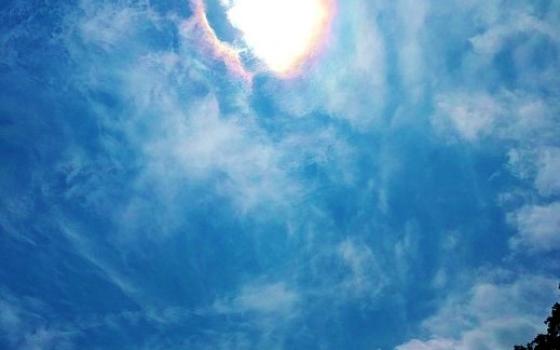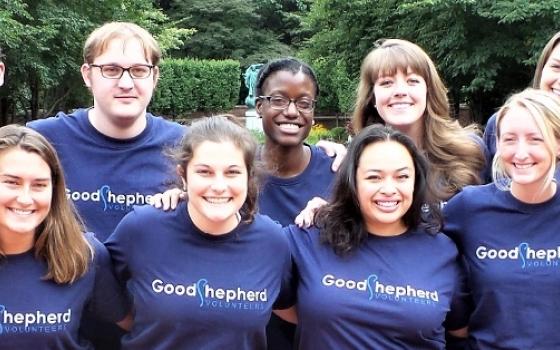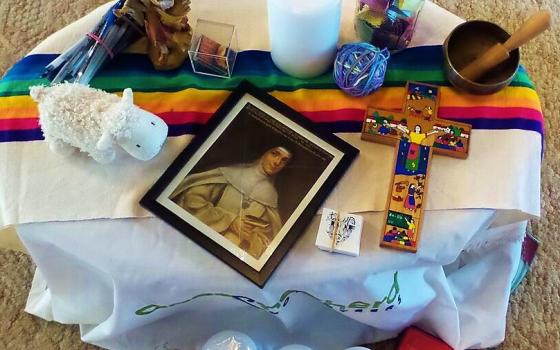Toward the end of August, when a cool breeze or two announced that summer would soon be ending, I spent some days with a group of young men and women committing themselves to a year of service and community.
Good Shepherd is one of many religious congregations that supports a volunteer program, and I was with a diverse group of young adults participating in an orientation process for a year with the Good Shepherd Volunteers.
I was a general support presence with limited responsibilities, so my days offered opportunity to reflect on what was happening around me. Why are these young people, only recently liberated from a four-year college structure, entering another program rather than pursuing their independent pathways? What is this call? I offer some personal thoughts from my short experience with them.
The 11 persons who came as strangers were quickly bonding as a group with the help of structured ice-breakers, shared input, meal-time conversation, and periods of personal reflection. Even as they started to know one another, they were preparing to depart in just days for lives in different situations across New York, New Jersey, California, Bolivia and Thailand.
They will live in small communities with other volunteers and work in social service programs. Their service will take place in sites such as adolescent residences, community-based youth development, shelter care for women, advocacy and policy departments, education with at-risk youth and — especially internationally — situations that require jack-of-all-trade skills!
The 2017 solar eclipse occurred coincidently during the orientation week. We were in New Jersey, about 10 hours from eclipse totality, but interest in the rare event generated excitement. On the afternoon of August 21, everyone wandered around with cameras, pin holes in paper, or strange looking glasses to participate in and understand the event. It was easy to slip into a metaphor for understanding the volunteer service process.
The sun is the dominant force in our universe. The pale moon in orbit infrequently passes between sun and Earth, obscuring the sun and giving a new sensitivity to our view of the world. The moon tempers the sun: The sky is changed, daylight is shaded, and the atmosphere cools. Normal expectations are skewed.
The volunteers I met have grown up within the ever-shining atmosphere of our dominant culture — call it the sun. And they commit themselves to pass between, even briefly, the culture and everyday experience; their pathways will have an effect on the environment — call them the moon! My amateur scientific premise may not be entirely grounded, but it helped me to understand that something rare takes place among volunteers, something that can change perceptions all around them.
The volunteers in orientation explored the strengths and uncertainties of adult spirituality, imagined how to celebrate occasions such as a communal birthdays in solidarity with the reality of poverty and exclusion, discussed the skills needed to serve persons with whose life experiences they may have no familiarity, and began to know social justice as a lifelong pathway rather than as an intellectual ideal. As they did this, something began to happen that made them realize that they could temper the light, cool the air and influence those in their orbit to think about the world a little differently.
Something small but radical! Something seemingly fleeting but embedded in the depth of the universe! Something rarely seen in totality but yet constantly searched for! Something very much a mystery!
Much in the world calls for tempering of intensity: the exclusion of migrants, the degraded lives of those consigned to global poverty, the appalling gap between those referred to as "haves" and "haves nots," the tolerance of racism and misogyny.
With the new volunteers I began to witness, if only through a pinhole, an eclipse — a movement, a force of the universe as unending as the pull of the tides. These young volunteers will cast shadow on all that we take for granted; they will challenge the every-day normal. Even in their early discussions, the shadows they threw challenged me to look again.
What do I really need to consume to sustain abundance? What are my deepest beliefs about the sacred and mysterious? How do I dedicate energy to a seemingly hopeless tide of neglect and non-caring? How do I transform society towards justice built on God's mercy and not on ever-measured scales of merit?
I did not learn the individual story of each volunteer, but I did get a glimpse of diversity — Latinas with lives founded on family migration stories, an African American with an eye on issues of Black Lives Matter, Caucasians raised in relative privilege deliberately moving to inner cities.
As with most young adults, questions of sexuality, identity, professional lives, relationships, personal growth and central values all hang in the balance of this year. I heard smatterings of deep faith, I heard tottering insecurity about the skill needed to face work challenges, I heard humor about the unknown challenges of community, and I heard an openness to explore new thinking and experiences. I heard a desire to see the world revolutionized, to be a place more hospitable for every person.
On my last day with the volunteers, I led a group session considering values. Mercy is a value I hold most dear and try to convey most deeply. The gentle shadow of an eclipsed sun can be a merciful realization that nothing is as it seems. The ability to ponder from our small perch on earth, the movement of God's universe, is merciful balm to the heart.
Just so, my glimpse of a few persons eagerly learning to be the moon, willing to move within unusual and mysterious confines with uncertain outcomes, putting their beliefs and yearnings in the face of the world signifies a respite, a cooling, a new perspective — this was mercy to me.
[Sr. Clare Nolan recently retired as training coordinator of the Good Shepherd International Justice Office. Good Shepherd is an international woman's religious congregation that is involved in providing social services in about 70 counties, with a particular focus on women and girls in vulnerable situations.]



